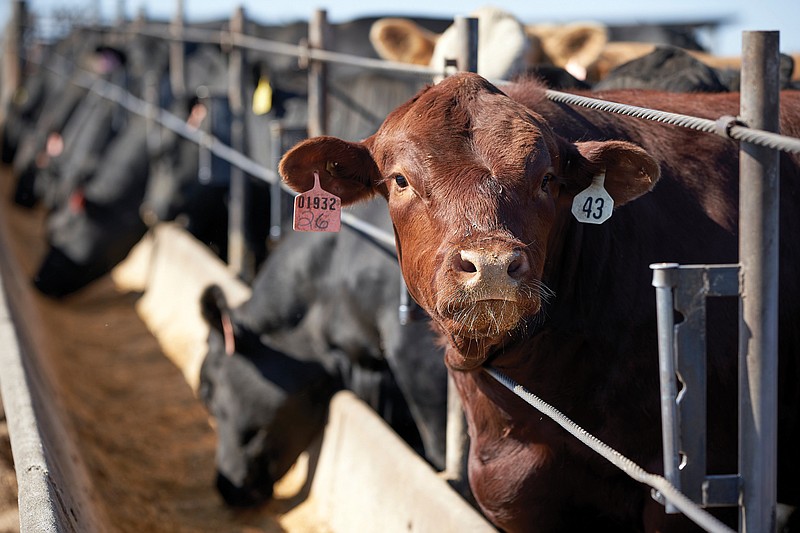Walmart Inc.'s purchase of a minority stake in Sustainable Beef LLC will help the Nebraska company build a processing center from which Walmart can source top-quality Angus beef.
The Bentonville-based retailer said Wednesday that it had reached an agreement with Sustainable Beef LLC in North Platte, Neb., to buy an unspecified stake in the firm for an undisclosed sum.
A Walmart spokeswoman said the deal, which has already closed, also gives Walmart representation on Sustainable Beef's board of directors.
David Briggs, Sustainable Beef's chief executive, told the North Platte Telegraph that local investors and founding ranchers own the bulk of the company.
The new plant will create more than 800 direct jobs, the companies said in a joint news release. They expect to break ground this month and open by late 2024.
The Walmart spokeswoman said the beef that Walmart buys from the new plant will go to stores in the central U.S. She did not say how much beef Walmart will source from the facility.
"There will be no change in our current suppliers," she said. "We value our supplier partners and look forward to working with them to continue to provide high-quality, affordable beef to our customers.
"This effort increases needed capacity for the beef industry and creates steady demand for cattle ranchers and jobs for those across the supply chain," the spokeswoman said.
"This partnership helps supplement the current beef industry and provides an additional way for ranchers and family farms to grow their businesses," she said.
No Arkansas ranchers are involved in the venture, she said.
Kelly Vierck, assistant professor of meat science and muscle biology in the University of Arkansas' Department of Animal Science, said sustainable beef is produced throughout the U.S. "by cattle ranchers and producers working to ... maintain and improve the natural resources used by the industry through regenerative grazing management, responsible grain sourcing, continuing economic viability for ranchers, and reducing its use of non-renewable resources."
The extra processing capacity will be welcome, Vierck said, especially since the pandemic revealed supply chain issues in the meat and food industries.
"A new plant with capacity for 1,500 head will help increase harvest capacity for the industry overall, especially with the unique model of being a rancher-owned company," Vierck said.
And in areas like North Platte, she said, local processors are few and shipping cattle for processing is expensive. A plant in this area would give small ranching outfits more consistent availability for processing, which in turn helps produce a more consistent, high-quality product, Vierck said.
"This also increases market competition for cattle in these areas, so there may be improvements in profits for producers as well," she said.
Tyler Lehr, senior vice president of merchandising for deli services, meat and seafood at Walmart U.S., said Sustainable Beef LLC "has a responsible approach to beef processing, one that includes creating long-term growth for cattle ranchers and family farmers."
"This investment provides greater visibility into the beef supply chain and complements Walmart's regeneration commitment to improve grazing management," Lehr said.
The investment is also part of a commitment the retailer made in 2019 to create its own end-to-end supply chain bringing Black Angus beef from pasture to store.
Walmart said in April that year that it was starting the venture by sourcing from best-in-class suppliers to put its all-natural, no-hormone-added beef in 500 stores in the Southeast.
The company said at the time that it was responding to customer demand for visibility in every step of the supply chain.
In 2020, Walmart opened a case-ready facility in Thomasville, Ga., where the beef was prepared for shipment to stores mainly in Georgia, Alabama and Florida.
But Walmart is looking beyond the U.S. to find customers for sustainable beef.
Walmart Canada recently said it is buying 1 million pounds of beef from certified sustainable Canadian farms and ranches.
That's in addition to its October 2021 commitment to buy 1.5 million pounds of sustainable beef.
"As we continue on our journey to becoming a regenerative company, we're always looking for opportunities to provide our customers with options that are better for the planet," said Rob Pereira, Walmart Canada's senior director of meat and seafood.
The retailer said in the release that it "has the potential to impact sustainability at every level of the supply chain."
"We believe customers shouldn't have to choose between products they can afford and products that are produced in an environmentally responsible way," the company said. "We collaborate with suppliers to make sure the products we sell are as affordable, safe and sustainable as possible."

